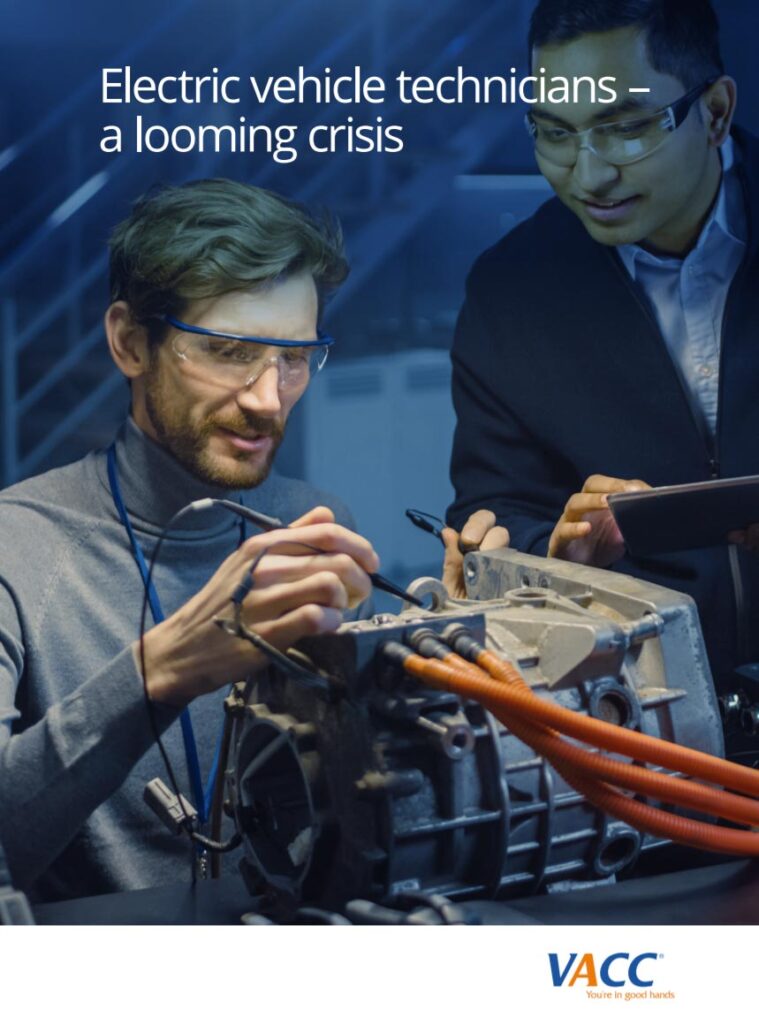Future shock: EV tech training needs boosting now
- PostedPublished 25 February 2022
A significant skills gap is set to develop unless more electric vehicle technicians are trained
A new report warns that Australia is on track to have just 17.5 per cent of the required electric vehicle (EV) technicians by the end of the decade.
The Victorian Automotive Chamber of Commerce (VACC), which published the report, says that 7,300 dedicated EV technicians will be required by 2030 – the point at which, according to government forecasts, the Australian electric vehicle fleet will total some 1.7 million vehicles.
At the moment, there are some 500 qualified EV technicians in Australia, servicing some 25,000 pure electric vehicles throughout the country.
The number of technicians has grown very slowly, in line with gradually increasing fleet numbers, but if the proposed and rapid EV expansion occurs – and no measures are taken to significantly bolster the workforce – a significant skills gap will develop.

Geoff Gwilym, CEO of the VACC, said: “Australia has eight years to increase the number of EV technicians by 1578 per cent to meet the Federal Government target.”
“The demand is going to come, it’s coming, it’s coming, and then all of a sudden I think it’s going to hit us hard. It takes around four years to train an apprentice and it takes about seven years for somebody to become highly proficient in the industry.”
The VACC’s report, which can be read online, is called Electric vehicle technicians – a looming crisis. The report outlines the potential market growth and skills shortfall, using modelling based on EV-heavy Norway, and it also catalogues the dedicated and specialist skills required to service and repair EVs.
“Unless the Government takes measures from now to ensure that we have the requisite skilled workforce in the future, then the planned sales boom in electric vehicles will be met with a lack of people qualified to work on them,” the report concludes.
One saving grace is that many organisations are already positioned to deliver EV training and capitalise on the potential future surge in demand – and more facilities and courses are appearing.
In Australia, the Motor Trade Association of Queensland (MTA Queensland) and its MTA Institute (MTAI) offer training courses for battery-electric and hybrid vehicles.
Other establishments offering EV and EV-related courses include Assured Learning Australia, training.gov.au and the PricewaterhouseCoopers (PWC) Skills for Australia organisation.
The Motor Trade Association of Western Australia (MTA WA) has also recently opened a new training facility dedicated to electric and hybrid vehicles.
In a story published on automotive news outlet GoAuto, MTA WA CEO Stephen Moir said: “This gives us the ability to be among the first training centres in Australia to deliver for the much-desired new level of automotive trades,” he said.
“At the same time, we are looking at a new era of young people that understand diagnostics and electronics and the different forms of electrified power plants and who want to be part of the automotive industry.”

A five-day battery and hybrid vehicle service and repair course with MTA WA, for example, includes training on how to depower electric vehicles, diagnose high-voltage storages systems and how to repair system instrumentation.
The MTA WA’s centre, which sits alongside existing educational facilities, is based in Balcatta, a suburb in the northern part of Perth, will also provide courses for diagnosing, servicing and maintaining advanced driver assistance systems.
The Motor Traders’ Association of New South Wales (MTA NSW), a registered training organisation (RTO) since 1996, is another that is also gearing up for the future.
It has appointed a new general manager – RTO, Ian Price, who has an extensive automotive background, both in Australia and overseas – including running an RTO called Vantage Automotive, working as a Land Rover Australia training manager, and lecturing at Bradford and Ilkley College in the UK.
“Ian has an impressive background in the automotive industry, both in education and leadership,” said Stavros Yallouridis, CEO of the MTA NSW.
“His experience and skill set will assist MTA in further developing our RTO, specialising in automotive technical training in electric, hybrid and hydrogen vehicle technology.
The organisation, which has been around for over 110 years, represents owners and principles in the automotive industry. It also aids owners in running their business and, like other such groups, it works with authorities to maintain, support and expand the country’s automotive industry.
- CategoriesIn SightGlass
- Tagssightglass news issue 26


